- Home
- Danielle Collins
Lights Out at the Lighthouse Page 3
Lights Out at the Lighthouse Read online
Page 3
“What would you like me to do?”
“I’d like you to look into Gerald’s life. See what he was up to, what his business with the lighthouse was like, things of that nature. You’re good with finding loose threads and pulling on them. I’d say pull away.”
She contemplated this and nodded slowly. “I can do that.”
“You sure you have the time?”
“I am.”
“Good. Then let me know when you hear something, and we’ll schedule an update meeting.”
She nodded, pursing her lips in a smile. They sounded so professional, and she almost felt like a real private investigator. Then again, she’d leave the real work to Ralph and do the investigation on her own.
She waved goodbye and headed out the door. First things first, she needed to see what Gerald’s life had been like, if she was going to understand his death.
4
The next morning, bright and early, Henrietta received an email with the information she’d asked Amelia for: a copy of her father’s itinerary the last few months of his life. Amelia had sent over photographs of the datebook that he used, and Henrietta had been able to establish the type of routine the man was in.
She’d noticed one thing in particular, though, a few days before his body had been found. An appointment with a local doctor that Henrietta knew, Dr. Mays. On the off chance that the man’s death would rule the patient-confidentiality precedent null and void, Henrietta set out to see Dr. Mays before his office officially opened.
She knocked on the side door he used exclusively for friends and family members and was pleased when he opened the door with a smile.
“Henrietta Hewitt. To what do I owe this pleasure?”
She smiled back, remembering the china cabinet he’d purchased from her for his wife last Christmas. “I’m doing well, Dr. Mays. May I come in for a few minutes? I know you’re busy, but I have a few questions to ask you.”
“Yes, yes, of course.” He stepped back and allowed her into his private office. Two leather chairs sat in front of his large oak desk, and she took one while he sat in a large leather office chair. It looked comfortable enough to allow him to go over his notes easily.
“What can I help you with?”
“I’m actually working on a case with Ralph Gershwin.”
“Since when did you become a private investigator?” he said with a laugh.
“Since Ralph begged me to join him,” she countered.
He laughed again and nodded. “How do I fit in to all of this?’
“We’re actually looking into the death of Gerald Folsom. We have reason to believe he was not the victim of suicide, but possibly of something more sinister.”
“Sinister?” The man leaned forward, his interest piqued. “How so?”
“I can’t really get into the details at this moment, but I do know that he had an appointment with you just a few weeks back. I know there are confidentiality rules in place, but he is dead and his daughter has hired us for this case.”
There were times when Henrietta missed living in the city. It came with many advantages in a variety of aspects, but there were times—times like this—when she was even more grateful to live in a small town.
“I’m not supposed to say anything,” Dr. Mays said, “but you do bring up a good point. He has passed, and…I’d like to help.”
Henrietta smiled in relief but kept it muted. No need to show too much excitement, lest the man rethink his decision.
“What can you tell me about that appointment? Did he seem depressed at all?”
“Quite the contrary,” Dr. Mays said. “He seemed upbeat and almost excited, if I had to name it.”
“Do you know why?”
“He’d mentioned that his daughter was getting married and he was looking forward to the wedding. He was also in excellent health—well, save for a trigger finger on his right pointer finger, but we were referring him to an orthopedist to have that taken care of.”
“Interesting. Is that why he came in?”
“Nope. It was just an annual checkup. He said he thought it was time. Said something like he was looking ahead to grandchildren, even though that was a ways off. Wanted to be healthy for them.”
A deep sadness sunk into Henrietta’s stomach at these words. It sounded more and more like Gerald Folsom never would have killed himself. He appeared to be a man who had a lot of things to look forward to.
“Did the police talk to you?”
“You could say that.”
“Why do you say it like that?” She sensed some hostility in his response.
“I tried to tell them just what I’m telling you, but that new detective,” he made a face, “it was like he was so interested in wrapping up his first new case in town, he’d rather not hear anything that contradicted his theory. I wanted to explain the situation, how Gerald had made the appointment himself and all that he’d talked about, but the man said it wasn’t important. Hearsay or something. Nonsense, if you ask me.”
Henrietta nodded solemnly. It seemed this new detective was going to continue creating waves, unless he was checked in one way or another. Then again, this was only his first case. Hopefully, he would begin to understand that things didn’t always go like they did in the big city—if that’s, in fact, where he was from.
“You’ve given me a lot to think about, Dr. Mays. Thank you so much.”
“You’re welcome. Like I said, I tried to tell them that they had it wrong, that Gerald would never kill himself, but they made it sound as if he couldn’t have done anything else.”
Henrietta had no information to that statement and merely shrugged her shoulders. “I suppose only time will tell at this point.”
“I hope you can find justice for Gerald. He was a good man and didn’t deserve to die in such a way—no matter at whose hand.”
“I agree.” She thanked him and left, her mind lost to the thoughts of the new detective as well as the facts she’d just gleaned from the doctor. There was no way that Gerald had sunk so low in the course of a few weeks, was there?
“I tell you, he’s going to ruin this town.” Ralph’s voice rose and Henrietta shot him a look that said Calm down, now. “Sorry.” He held up a hand, as if to stay her admonition.
“What happened, exactly?”
They were out to dinner in a seafood restaurant that overlooked the water, the long rays of the sun sparkling off whitecaps in a tumultuous sea. After her successful meeting with Dr. Mays, she’d called up Ralph to deliver the information, and he’d asked her to dinner instead.
Not one to pass up an excellent meal or Ralph’s company, Henrietta was glad she’d gone but was wondering if this conversation was better suited to the privacy of the Gershwin offices.
“I went to meet up with Ken. You remember old Kenny, right?”
She nodded, taking another bite of her flaky halibut.
“We always meet up in that deli. Anyway, he came in and said this young upstart is ruining everything.”
“Who is he?”
“Name’s Abraham Paige. Comes from none other than Chicago and thinks he’s God’s gift to law enforcement.”
She shot Ralph a look, and he relented. “All right, so maybe I’m reading into it a little. Or a lot,” he added after another look from Henrietta. “Either way, he’s putting a stop to the department’s ‘small-town ways’ or however he’s stated it.”
“Such as?”
“Ken said that he’s pushing to close cases as quickly as possible—as if that wasn’t the goal to begin with—and he’s got this whole new list of best practices.”
“Sounds like it could be helpful.”
The look Ralph shot Henrietta was chilling, to say the least. “No, it’s putting a stop to some very helpful procedures that have worked well for this department. We’re not Chicago. We’re not even Seattle, and we’ll never be. But all okay. You’ve got to find things that work for your area, and this kid doesn’t know what he’s doing.”
“You can’t say that, Ralph.”
“Look what he did with Gerald Folsom’s case.”
She shrugged. While that was true, she didn’t want to jump to the conclusion that everything this new detective did would be bad for the town. Perhaps there was something to be gained from a new perspective. Still, she wouldn’t bring that up to Ralph just yet.
“Perhaps we should give him the benefit of the doubt.”
“Yeah, well, we’ll see. I don’t know how much I’ll be able to get from Ken these days now. Seems like the dictator is cracking down on information.”
“I was never sure that it was a good idea for you to know what you did, or how you did.”
“Not you, too.” Ralph rolled his eyes as he finished off his salmon.
“Either way, I did find out some interesting information at Dr. Mays.”
“What’s that?”
She shared what she’d learned from Dr. Mays, and Ralph agreed that it was compelling evidence.
“See? If that youngster would have listened to what Doc was saying, he might have changed his mind on Gerald’s death. He’s being short-sighted.”
“He may be, but perhaps he just needs time to adjust. To learn, you know?”
“Maybe.” Ralph didn’t sound like he held out much hope for that reality, though.
Ralph paid their tab, and they put on their coats to head out. Just as they reached the door, Henrietta heard her name as it was called out across the restaurant.
“Oh no,” Ralph said, reaching for her arm. “Let’s pretend you didn’t hear him.”
“Ralph,” she chided, looking back as Mayor Rickey Lawrence wove his way through the maze of tables toward them. “It’ll only be a minute. You can go on without me if you want.”
He merely looked at her, but any reply was cut off when the mayor caught up with them.
“Henrietta Hewitt, just the person I was looking for.”
“Good evening, Rickey,” she said. “You out with Lois tonight?”
“Yep, she’s over there picking the clams out of her clam chowder.”
“I…oh.” Henrietta wasn’t sure how to respond to that.
“Doesn’t like them. Too chewy, she says. Anyway, I’m so glad I caught up with you. I’ve been meaning to stop by the shop, but I’ve been too busy. Too busy, I tell you.”
“I’m sure,” Henrietta mused.
“How are preparations for the dance coming?” he asked, clasping his hands in front of him as he awaited her reply.
“They are going very well. Olivia has been a big help, and we’re about ready to move in the larger pieces so it can be arranged.”
“Will everything be ready in time?” he asked, looking genuinely concerned.
“Of course.” She offered a light laugh. “We certainly won’t rest until it’s ready.
“I just—” He looked left and right, then left again, before lowering his voice to a whisper. “Things are…tight. You know, financially. This simply must be the best dance Hearts Grove has ever seen. You understand? The. Best. There’s no way around it.”
“Yes, well, we’re certainly doing what we can to make sure that it is the best one we’ve had. Ever,” she added, to satisfy his insistence.
“Good, good, good.” He glanced at Ralph before looking back at her. “I’d heard rumors you were working with Ralph here on a case, but that’s clearly impossible, seeing as how you have a full plate.” His nervous laughter betrayed him.
“I am working with Ralph,” she began, but rushed on at the look of shock on Rickey’s mouse-ish features. “But I have plenty of time for both things.”
“And your shop?”
“It’s the slow season.”
He didn’t look convinced.
“Truly, Rickey, the decorations are almost done—though not in place yet, they are ready to go—and we promise everything will be ready. It will be spectacular.”
“I’m just not—”
“Thanks so much for saying hello,” Ralph said, patting the mayor’s arm rather forcefully as he latched onto Henrietta's other arm. “But we’ve got to go. Business, you know?”
Just then, Henrietta’s phone rang as well. She didn’t recognize the number but used the additional excuse. “I promise we’ll have everything ready and extra-magical,” she said, waving her ringing phone in excuse as they stepped out the door, leaving Rickey nervously wringing his hands.
Ralph was about to comment on the exchange when Henrietta answered the phone. “Hello?”
“Is this Henrietta Hewitt?”
“This is she.” She didn’t recognize the voice on the other end of the line, but the wind had picked up, making it difficult to hear who was on the other line.
“Oh, good. This is Amelia Folsom.”
“Hello, Amelia,” she said pointedly so that Ralph would know who she was on the phone with.
“I’m sorry to call kind of late, but I got your number from Gina. Hope you don’t mind.”
“No, that’s fine. What did you need?”
“I found something at the lighthouse as I was cleaning today. I think you should come see it. Ralph told me you’d be working on the personal aspects of the case and…well, I think this fits in with that.”
Henrietta’s eyebrows rose, and she nodded to herself as she answered. “Yes, I am. I could come by tomorrow, if that would work?”
“Yes, I can meet you there at ten.”
“Perfect. I’ll see you then.”
“Thank you and good night.”
“Night,” Henrietta said as she hung up.
“Was that Amelia Folsom?”
“It was. It sounds like she’s found something of interest at the lighthouse.”
“Perfect,” he said, grinning. “Want me to come with you?”
Henrietta weighed his words but slowly shook her head. “I think I should go by myself, at least at first. I think it would be good for me to get to know Amelia a little bit and see if she can offer any more information.”
“Sounds good to me. I trust your intuition.”
“Perfect. Does that mean you’ll take me to Bert’s?”
He rolled his eyes at her mention of their favorite ice cream place. “If your intuition insists, then I cannot deny it.”
She grinned, and he extended his arm for her. To Bert’s it was.
5
The Starlight Lighthouse sat atop a rocky hill overlooking the choppy February waters. A thin mist hung at its base despite the late-morning hour, and Henrietta wished she’d brought a camera to capture the sight. It looked as if the lighthouse was rising from a magical fog.
She’d come a few minutes early and took her time walking up to the lighthouse, taking stock of the area. She knew from the papers that Gerald’s body had been found in the lighthouse, but not much more than that. With the new detective in town, it was likely they wouldn’t know exactly how things had been found, but she planned to ask Amelia to share what she knew, if anything.
It was risky, not to mention possibly insensitive, asking such a thing, but Henrietta came back to the fact that the young woman had asked them for help. In order to do that, they needed all of the facts and as much information as they could gather.
As Henrietta circled around the base of the lighthouse, she saw the door through which she assumed she’d find the lighthouse keeper’s quarters and the residence of Gerald Folsom. The other main area, the part that was often opened to the public in the warmer months, was around the opposite side.
From her vantage point, she could see a small window beside the door but nothing else. To her knowledge there wasn’t another entrance to the keeper's quarters, only the one front door. That limited access quite a bit and meant that, if Gerald hadn’t killed himself—a fact she believed in more and more—then someone had come in to do the deed.
She came up toward the door slowly, observing the path. She didn’t hope to find anything particular there. Nothing that would point out who had come in, n
ot this long from the time of the incident, but she did want to observe. It was what she did best, and she put her full powers of observation to the test.
The walkway was covered to the right side with shrubs that reached over six feet high. The other side started exposed and easily seen from the road; then as it dipped down with a stone wall rising up, a person would soon be obscured from the roadway. It made the entrance to the lighthouse keeper's quarters very secluded.
At the door, Henrietta began to inspect the lock closely. From her outside vantage point, it didn’t look as if anyone had tampered with the mechanism. Then she moved to the window and noted that, while it was functional and likely opened by unlatching from the inside, there would be no way to enter through it without breaking it in.
“Henrietta?” Amelia said as she came around the outside of the lighthouse.
“Hello,” Henrietta said, turning away from her window inspection. “I was just…looking.”
“Of course. Here, let me get you inside.”
The young woman unlocked the door, and it creaked as it swung inward. The space was sparse, decorated with only what looked like the necessities aside from an overstuffed bookshelf on the backwall.
“I haven’t had the heart to pack this up yet,” Amelia said. “I cleaned out his storage closet on the other side and took a few things out, like food and such, but,” she looked around the room, “this was my father’s life for so many years. It’s hard to think of destroying it.”
“I can imagine,” she said, crossing to the small potbelly stove. The shelf behind it boasted a few small frames, and she looked at each one without touching. One frame held a photo of Amelia with Gerald. It looked to be a few years old, judging by the length of Amelia’s hair now, but the smiles on both of their faces spoke volumes.
Next was an old black-and-white image of the Starlight Lighthouse. It looked to be vintage and from the era of the lighthouse’s glory days. Then, the last photo was of a grassy field with a blurry image in the distance. It looked like the form of a woman but was so blurry, with the flowers in the foreground being the focus, that you couldn’t make out any details of the person. It was a lovely photo, though.

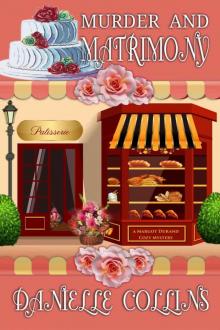 Murder and Matrimony
Murder and Matrimony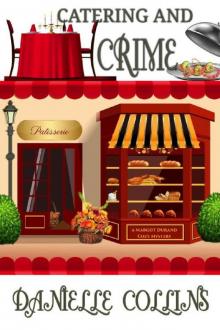 Catering and Crime
Catering and Crime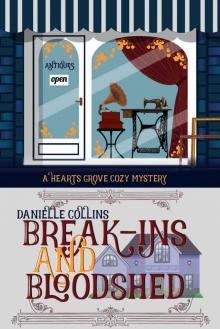 Break-ins and Bloodshed
Break-ins and Bloodshed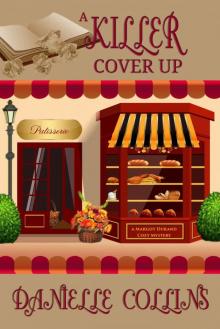 A Killer Cover Up
A Killer Cover Up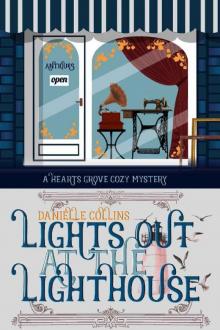 Lights Out at the Lighthouse
Lights Out at the Lighthouse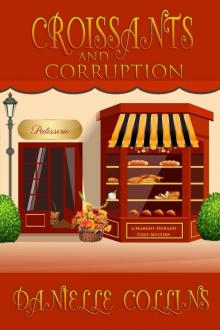 Croissants and Corruption: A Margot Durand Cozy Mystery
Croissants and Corruption: A Margot Durand Cozy Mystery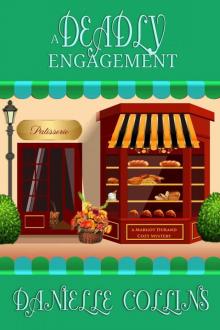 A Deadly Engagement (Margot Durand Cozy Mystery Book 9)
A Deadly Engagement (Margot Durand Cozy Mystery Book 9)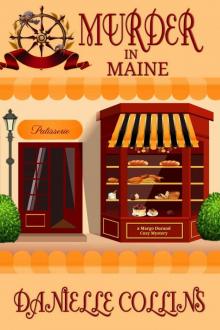 Murder in Maine (Margot Durand Cozy Mystery Book 7)
Murder in Maine (Margot Durand Cozy Mystery Book 7) Desserts and Deception: A Margot Durand Cozy Mystery
Desserts and Deception: A Margot Durand Cozy Mystery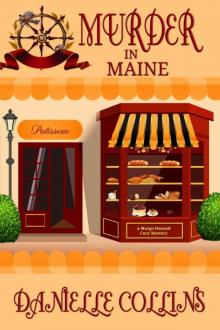 Murder in Maine
Murder in Maine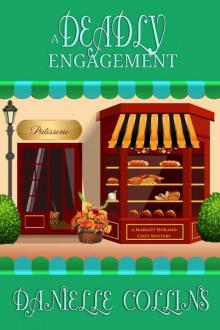 A Deadly Engagement
A Deadly Engagement Bakeries and Bodies
Bakeries and Bodies Pastries and Pilfering
Pastries and Pilfering Pastries and Pilfering: A Margot Durand Cozy Mystery
Pastries and Pilfering: A Margot Durand Cozy Mystery Bakeries and Bodies (Margot Durand Cozy Mystery Book 8)
Bakeries and Bodies (Margot Durand Cozy Mystery Book 8)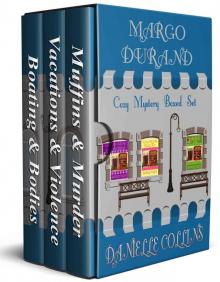 Margot Durand Cozy Mystery Boxed Set: Books 4 - 6
Margot Durand Cozy Mystery Boxed Set: Books 4 - 6